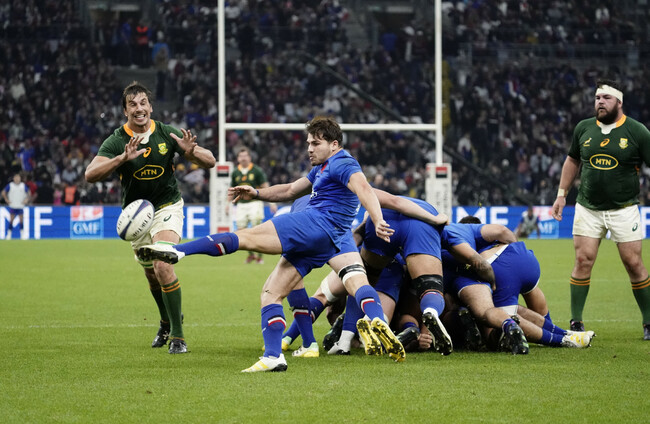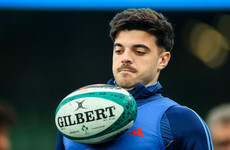1. France
The pre-tournament favourites, just — but also with just cause.
The hosts have meticulously plotted their way towards a tournament in which all of their prospective knockout games would take place at Stade de France, where Les Bleus were last beaten — in front of spectators, at least — in February 2019.
They are elite in every facet of the game, they have one of the world’s best coaches at the wheel, and they run their game through a captain who so routinely does inconceivably brilliant things with a rugby ball that there is a growing consensus that he’s the greatest player ever to play the game — at 26.
Fabien Galthié, Antoine Dupont and co. are primed to finally lift the Webb Ellis Cup for their country provided they don’t lose a critical mass of frontline stars to injury.
France’s talent might run deeper than any of their fellow contenders but the surface has already taken a couple of scratches in the shapes of Romain Ntamack and Paul Willemse, while Cyril Baille and the indomitable Jonathan Danty will miss Friday night’s curtain-raiser with New Zealand.
Galthié’s side can absorb those losses for the moment but they’ll require as much experience and power as possible if they are to steer their way through what will be a dangerous quarter-final, whichever way it shapes up.
2. Ireland
Justifiably the world’s number-one team entering the tournament.
Ireland have won 20 of their 22 games since the run-in to the 2021 Six Nations and have beaten all of their fellow contenders in the last 15 months.
Their pack is a totally different prospect to opposition than that of four years ago, the addition of nuclear weapons such as Dan Sheehan and Caelan Doris — among other upturns in form and size — making them a force to be reckoned with even for the slightly more powerful armies of France and South Africa.
Where Ireland might not boast the same explosive profile of athlete as those two countries, or even New Zealand, in their backline, they do boast some of the most cerebral and well-rounded backs in the world game.
That has been evidenced in the universality of Andy Farrell and Mike Catt’s attack, with which Ireland can typically solve puzzles on the fly, but equally in Simon Easterby’s defence which ships fewer points per game on average than any of their fellow contenders.
Ireland are also by far the most disciplined team in the competition: remarkably, their last card of any description was a yellow given to Andrew Porter in the third test against New Zealand, 12 games ago.
Stacked against them is the draw. If Ireland are to go the whole way, they will have played five successive games against Tier One opposition in the space of six weeks, which would be an unholy task for any side in the world.
Whether or not their improved squad depth can stand up to that kind of physical onslaught will be largely down to chance, but their head coach has spent the guts of three years preparing for what the country hopes can be a biblical run.
3. South Africa
The world champions and many people’s favourites to do it for a fourth time.
In 2019, South Africa timed their run to perfection: they shadow-boxed to defeat in their opener against New Zealand, eased through the rest of their pool, and then met Japan and Wales in the knockouts before flexing their muscles to devastating effect in the decider against England.
This time around, Rassie Erasmus and Jacques Nienaber’s side will need to frontload some of their most intense work in the knowledge that a defeat to Scotland this Sunday would leave them on the brink of embarrassment, with Ireland to come.
In general, though, the schedule will suit South Africa: they’ll have plenty of breathing space both before and after their Round 3 meeting with Ireland to spread minutes across their whole 33-man squad, and to reset before a colossal showdown with either the All Blacks or France in the quarters.
These Springboks have more strings to their bow — and arguably boast more talent overall — than the world-conquering of four years ago. Provided they make it out of their pool with most of those strings still attached, they’ll be a frightening prospect for any opponent.
One slight concern? Out-half: Manie Libbok is an often breathtaking playmaker but there exists enough evidence to suggest that the Stormers star’s kicking — both off the tee and out of hand — is erratic when it truly counts.
4. New Zealand
Kiwis… firstly, are you okay?
What a weird 15 months it’s been for the All Blacks.
Beaten in a home series for the first time in 28 years, and the first time ever by Ireland. Invoked Joe Schmidt. Beaten at home by Argentina for the first time ever. Announced Ian Foster’s scheduled departure — and his replacement — but for after the World Cup. Won the Rugby Championship. Became the bookies’ favourites to win the World Cup. Suffered a record defeat to South Africa.
And here we are.
Foster’s side have dropped off a lot of radars since that 35-7 mauling at the hands of the ‘Boks at Twickenham last month and, in all reality, this New Zealand team likely enters the tournament under less pressure at home than any of its nine World Cup predecessors. What a fascinating prospect.
The consensus both among All Black fans and outside of their country is that the Kiwis’ pack is fractionally lightweight in comparison to the other three leading contenders and that a number of their key forwards are in athletic decline.
Their backline, on the other hand, is markedly more organised — and more electrifying — than was the case during last year’s summer series with Ireland. Will Jordan and co. are liable to put any side in the tournament to the sword should the men in front of them manage to summon enough snarl to provide them with an extra couple of seconds.
Putting too much stock in that ‘Boks beating a few weeks ago would be folly. Stranger things have happened than New Zealand winning this World Cup.
5. Scotland
Ah, who knows?
By dint of the fact that they’ve landed in the Pool of Death on the wrong side of the Tournament Draw from Hell, Scotland are not the fifth most likely team to win the World Cup.
But are they the fifth best team? Look, also possibly not — but they did batter an ill-disciplined Argentina in November and, frankly, Gregor Townsend’s side have been broadly more impressive than Los Pumas this summer to boot.
All logic would suggest that the Scots don’t quite have the cattle to earn the right to stretch South Africa at the edges this Sunday and that their World Cup fate will be decided in a meeting with Ireland in their final pool game.
Logic, however, has very little place in a game involving Finn Russell, who has sufficiently mended bridges with Townsend to the point that Scotland have reverted to playing in the Bath out-half’s image.
And from Townsend’s point of view, why not? It’s no secret that his union went to market to seek his replacement only a few months back only to discover that the job wasn’t as appealing as they would have liked to have believed.
So, the shackles, as well as the pressure, are off. Scotland are going to have some fun. And truly, that is not to condescend: this Scotland team having fun makes for a live threat to any team in the world.
6. Argentina
Easily fifth on their day, but have spent more days bobbing between sixth and seventh.
Michael Cheika’s Pumas have achieved some landmark results during his short tenure, including the aforementioned first ever win on New Zealand soil.
Unfortunately, their result against the All Blacks the following week was an exaggerated illustration of Argentina’s inability to string together back-to-back performances of physical and emotional intensity: they lost to a poked bear, 53-3.
Similarly to the All Blacks, Los Pumas possess a pack — and back row led by Paolo Matera, especially — which, when operating at full capacity, can afford the likes of Emiliano Boffelli and Juan Imhoff the platform to cause havoc.
Certainly, they pack enough whack across the board to make it out of their pool. Rather perfectly, Argentina open with their two biggest fixtures against England and Samoa respectively, which will allow them to manage minutes for three weeks before the quarters.
Provided they make it that far, there are few better coaches than Cheika to steer them through what will be a soft knockout bracket. The only man ever to taste success as a head coach in both the European Cup and Super Rugby, Cheika followed his latter title with the Waratahs in 2014 by dragging an average Australian side to the World Cup final in England a year later.
7. Australia
Speaking of average Australian sides… This is probably another one.
Eddie Jones, yet to win five games into his second reign, tore up the script with his squad selection and brings with him the second least experienced travelling party of the top sides.
Remarkably, just under half of Australia’s 33 players have fewer than 10 caps, including the out-half on which Jones has hung his hat, Carter Gordon.
It’s difficult to envision the Wallabies bringing anything other than utter chaos to proceedings which, when complemented with game-breakers like Mark Nawaquanitawase, should be something to look forward to — unless you’re from Australia, arguably.
Their in-game discipline was extraordinarily bad under Jones’ predecessor, Dave Rennie, and it has trended in the same direction since, most recently hampering them at a time in which they seemed as though they might give France more to think about at the Stade de France last month.
Ultimately, Jones’ young Wallabies have virtually none of the required materials to win a World Cup; but do they have the raw ingredients to beat Wales and/or Fiji in their pool? England or Argentina in the last eight?
You betcha. Catch you in the semis, Eddie.
8. Fiji
It’s an unbelievably cruel twist — for the player, for his country, and even for the tournament — that Fiji will have to do without their game-changing out-half Caleb Muntz for the next couple of months.
With only the untested 32-year-old Teti Tela offering out-half cover, head coach Simon Raiwalui will likely call up Ben Volavola or Vilamoni Botitu as Muntz’s replacement. None of the three, however, offer the Drua 10′s assuredness of hand and boot, nor his ability to game-manage which for so long had felt like one of two missing links in this exciting Fijian team.
The other was their set piece, which passed its acid test in Twickenham to such an extent that it should probably no longer be seen as a lingering question mark but a strength.
Fiji’s plethora of game-breakers will allow Raiwalui to decentralise their attack from around the 10 slot, and while they are undoubtedly a worse side for Muntz’s absence, they will still fancy their chances against the far less dynamic Wales in a potentially pivotal pool game this Sunday.
9. Wales
The Welsh take ninth over England on account of the fact that, if you squint your eyes and really concentrate, you might be able to make out the faint outline of hope for Warren Gatland’s men.
It’s tough to split the British neighbours after two truly dreadful summer warm-ups between them, but Wales at least enter this tournament relieved of any real expectation by the sheer dysfunction of the sport in their homeland.
Perhaps the better feeling about Wales emanates from the sense that they can only improve, whereas it feels like there is still scope for England to get worse.
Wales have every chance of progressing from their pool. They may also lose to Georgia. It’s not beyond the realms of possibility that they do both. Strap in.
10. England
More like hit the ‘eject’ button.
While England’s squad is not as strong as Premiership diehards would have you believe, it was absolutely strong enough to have beaten Fiji at Twickenham.
The true nadir for England that day was that Fiji themselves played well below capacity; it was, after all, just a warm-up game for the visitors as well — and a performance strewn with errors, at that.
In reality, Steve Borthwick’s blueprint for his brilliant success with Leicester was simplistic enough that, if it was going to be replicable with England at all, it would have ‘taken’ by now.
There is an increasing sense that England’s players just want to get this tournament over with, perhaps aware — consciously or otherwise — that they’re on a hiding to nothing.
…or on a hiding to a semi-final on account of that bloody draw!
11. Italy
Italy aren’t going to make it out of their pool, although they’ll probably give France a right game of it as they tend to most springs.
It’s cruel on Kieran Crowley’s men that they were landed in alongside the hosts and the All Blacks, because they would have a serious chance of reaching a quarter-final — and, at a stretch, even going beyond that — had they wound up on the weaker side of the draw.
An early exit will feel like scant return for several years’ good work, but such a young squad will take invaluable experience from the tournament into future Six Nations and beyond.
12. Samoa
A side with which Ireland became intimately familiar last month.
It would be an understandable argument that Seilala Mapusua’s men deserve a higher billing than Italy, albeit Ireland’s poor display accentuated a lot of Samoa’s strengths in Bayonne: their only try, after all, came from a misplaced Stuart McCloskey pass straight into Duncan Paia’aua’s face.
Their scrum was no joke, though, nor was their defence or, indeed, their defensive lineout. What can’t be argued is that, in a pool with England and Argentina, a side with such solid fundamentals as Samoa have a slightly better chance than Italy of reaching a quarter-final.
Ultimately, it might be one World Cup cycle too early for this Samoan outfit to truly announce itself on the world stage — but Mapusua’s side have a lot going for them in the coming years.
13. Georgia
A live grenade in Pool C alongside Australia, Wales, Fiji and the exciting-looking Portugal.
Most of the positive generalisations of Georgian teams apply to Levan Maisashvili’s side: they’re made of concrete, they’re monster scrummagers, they all have huge beards.
But what the superb Maisashvili and his staff have instilled in this Georgian crop is an ability to play ball — and play it well — once it’s on.
Davit Niniashvili is Murray Kinsella’s pick for Breakout Player of the Tournament, and the 21-year-old Lyon outside back — who kicked his country to a sensational win against Wales in Cardiff in November — will be hoping for further scalps in France.
Georgia might well have a say in the eventual quarter-final lineup — but it would still be a seismic turn-up for the books if they made it that far themselves.
















Do people believe that this sh!te is real? The ‘showdown’ with Mayweather where both hardly laid a glove on each other, made crazy money out of it, the bus attack and what happened after the fight last weekend. It was barely over and the rematch was been planned where once again they will make a fortune and McGregor will somehow come out on top once again!
All this is the modern version of Hulk Hogan, Bret the ‘Hit Man’ Hart and rest of WWF in years gone by!
@Maureen: I’d love to see a victory by the Hulk Hogan Atomic leg drop!
@Maureen: the fighting is real tho?
People talk shite about Mayweather but one thing he was in the ring was extremely disciplined. He never let the words of an opponent get to him, never let a fighters taunts or style throw him off his game plan. Khabib is a great fighter but he lost his cool that night. McGregor is a great shite talker, buy not much else.
@Stipe Miocic: another thing he is a f****** Cowardly wife beater.. his kids testimony in court is harrowing to say the least.
@Stipe Miocic:
Ask Victor ortiz about that.
@Macus Mc Mahon: Protect yourself at all times.
@PScald: You were in his house when it happened, You’re an eye witness?
Oh no he wasn’t!
Oh yes he was!
Give me strength. What a of sh!te.